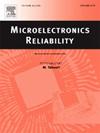氮化镓MMIC PAs在不同漏极偏压下的状态应力降解机理研究
IF 1.9
4区 工程技术
Q3 ENGINEERING, ELECTRICAL & ELECTRONIC
引用次数: 0
摘要
本文研究了氮化镓(GaN)单片微波集成电路(MMIC)功率放大器(PAs)在不同漏极偏置的状态应力下的降解机理。研究发现,在高漏极偏压下,直流(DC)和射频(RF)特性显著下降,这主要归因于热电子效应。利用发射显微镜(EMMI)技术,可以得出结论,GaN MMIC功率放大器的主要降解发生在有源元件而不是无源元件。通道热电子效应有两个影响。第一个是漏极边缘附近的漏电流路径,这是由超越AlGaN/GaN势垒的高能热电子引起的。二是在栅极和漏极之间的有源区域产生电子捕获,会降低直流和射频性能。最后还发现,在250℃的高温下,应力过程中产生的圈闭也不容易恢复,这表明这些圈闭可能位于较深的能级。本文章由计算机程序翻译,如有差异,请以英文原文为准。
Study on the degradation mechanism of GaN MMIC PAs under on-state stress with different drain bias
In this work, the degradation mechanisms of Gallium Nitride (GaN) Monolithic Microwave Integrated Circuit (MMIC) Power Amplifiers (PAs) under on-state stress with different drain bias have been studied. It is found that the direct current (DC) and Radio Frequency (RF) characteristics degrade significantly at high drain bias, which is mainly attributed to hot-electron effect. Using emission microscopy (EMMI) techniques, it can be concluded that the main degradation in GaN MMIC power amplifiers occurs in active components instead of passive components. The channel hot electron effect shows two impacts. The first one is the leakage current path near the drain edge, which is caused by the high-energy hot electrons that surmount AlGaN/GaN barrier. The second one is electron trapping within the active region between gate and drain, which can reduce the DC and RF performance. Finally, it is also found that the generated traps during the stress cannot recover easily even at high temperature of 250 °C, which indicates these traps are probably located at deep energy levels.
求助全文
通过发布文献求助,成功后即可免费获取论文全文。
去求助
来源期刊

Microelectronics Reliability
工程技术-工程:电子与电气
CiteScore
3.30
自引率
12.50%
发文量
342
审稿时长
68 days
期刊介绍:
Microelectronics Reliability, is dedicated to disseminating the latest research results and related information on the reliability of microelectronic devices, circuits and systems, from materials, process and manufacturing, to design, testing and operation. The coverage of the journal includes the following topics: measurement, understanding and analysis; evaluation and prediction; modelling and simulation; methodologies and mitigation. Papers which combine reliability with other important areas of microelectronics engineering, such as design, fabrication, integration, testing, and field operation will also be welcome, and practical papers reporting case studies in the field and specific application domains are particularly encouraged.
Most accepted papers will be published as Research Papers, describing significant advances and completed work. Papers reviewing important developing topics of general interest may be accepted for publication as Review Papers. Urgent communications of a more preliminary nature and short reports on completed practical work of current interest may be considered for publication as Research Notes. All contributions are subject to peer review by leading experts in the field.
 求助内容:
求助内容: 应助结果提醒方式:
应助结果提醒方式:


